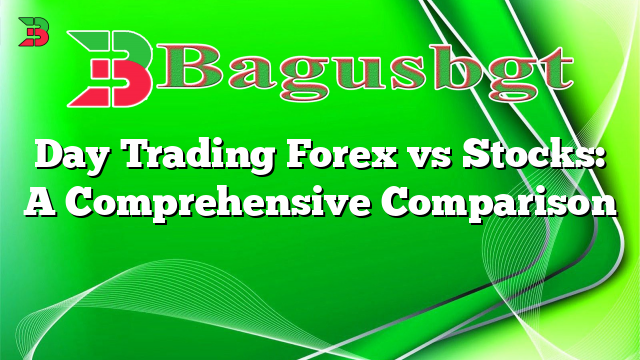Hello readers,
Welcome to this informative article where we will explore the key differences between day trading forex and stocks. As both of these investment options have their own unique characteristics, it is essential to understand the advantages and disadvantages of each before making a decision. In this article, we will delve into the details of day trading forex vs stocks, providing you with a comprehensive analysis that will aid you in making an informed choice.
1. Volatility
One of the significant differences between day trading forex and stocks lies in their volatility levels. Forex, also known as the foreign exchange market, is the largest financial market globally, providing traders with ample opportunities due to its high liquidity and constant price fluctuations. On the other hand, stock markets tend to exhibit lower levels of volatility, making it a more stable option for day traders.
Forex: High volatility
Stocks: Low volatility
2. Market Hours
Another important aspect to consider is the market hours of forex and stock trading. Forex operates 24 hours a day, five days a week, allowing traders to engage in day trading at any time. This flexibility enables individuals to trade according to their preferred schedule. In contrast, stock markets have specific trading hours, generally aligned with the local business hours of the respective stock exchanges.
Forex: 24/5 market hours
Stocks: Limited trading hours
3. Liquidity
Liquidity refers to the ease with which an asset can be bought or sold without significantly impacting its price. Forex markets are highly liquid, as they involve the trading of major global currencies. This high liquidity ensures that traders can enter or exit positions quickly, even when dealing with large volumes. Stocks, on the other hand, may have lower liquidity, particularly for smaller companies, which can result in price slippage and difficulty in executing trades.
Forex: High liquidity
Stocks: Variable liquidity
4. Leverage
Leverage is a tool that allows traders to control larger positions with a smaller amount of capital. In the forex market, leverage is commonly offered by brokers, providing traders with the potential for significant profits from relatively small investments. However, it is crucial to note that leverage also amplifies potential losses. In contrast, stock trading typically involves lower leverage or no leverage at all, reducing the risk but also limiting the potential returns.
Forex: High leverage
Stocks: Low or no leverage
5. Market Access
Accessibility to the market is another factor to consider when comparing day trading forex and stocks. Forex is generally more accessible as it does not require traders to have significant capital to enter the market. Additionally, the forex market is open to individuals from various countries, offering a broader range of opportunities. In contrast, investing in stocks often requires larger capital and may be subject to specific regulations and restrictions imposed by individual countries.
Forex: More accessible
Stocks: Higher barrier to entry
6. Diversification
Diversification is an essential risk management strategy for traders. Forex trading provides the opportunity to diversify by trading various currency pairs simultaneously. This allows traders to potentially benefit from different economic conditions worldwide. Stocks, although offering some degree of diversification within a particular market, may not provide the same level of global exposure as forex.
Forex: Higher diversification potential
Stocks: Limited diversification
7. Information Availability
Access to information can significantly impact trading decisions. In the forex market, information is widely available, with news and economic indicators affecting currency prices. This transparency allows traders to make informed decisions based on real-time data. While stocks also have publicly available information, it may be more challenging to obtain comprehensive and up-to-date data, particularly for smaller companies.
Forex: Abundant real-time information
Stocks: Information availability may vary
8. Transaction Costs
Transaction costs play a crucial role in day trading, as they directly impact profitability. Forex trading typically involves lower transaction costs, as the majority of brokers offer commission-free trading and earn through spreads. In contrast, stock trading often incurs brokerage fees and commissions, which can significantly reduce profits, especially for high-frequency traders.
Forex: Lower transaction costs
Stocks: Higher transaction costs
9. Psychological Factors
The psychological aspects of trading should not be overlooked. Forex trading is often more fast-paced and requires constant monitoring, potentially leading to heightened stress levels for some traders. Stocks, on the other hand, may offer a more relaxed trading environment due to their lower volatility and longer-term investment opportunities.
Forex: Higher stress levels
Stocks: Potentially lower stress levels
10. Conclusion
In conclusion,
Day trading forex and stocks both have their own unique advantages and considerations. Forex trading offers high volatility, 24/5 market hours, and accessibility, but it also involves higher stress levels and potential risks associated with leverage. On the other hand, stock trading provides stability, lower transaction costs, and potentially lower stress levels, but may have limited liquidity and global exposure.
When deciding between day trading forex and stocks, it is crucial to consider your risk tolerance, trading style, and investment goals. Some traders may prefer the fast-paced nature of forex, while others may opt for the stability offered by stocks. Ultimately, the choice depends on your individual preferences and the level of commitment you are willing to dedicate to your trading endeavors.
FAQ
| Question | Answer |
|---|---|
| Q1: Can I day trade both forex and stocks? | A1: Yes, it is possible to day trade both forex and stocks. However, it is essential to understand the differences between the two markets and develop separate strategies for each. |
| Q2: Which option is more suitable for beginners? | A2: For beginners, stocks may be a more suitable option due to their lower volatility and greater stability. Additionally, stocks offer the opportunity to learn about individual companies and industries. |
| Q3: Are there any risks involved in day trading? | A3: Yes, day trading involves risks, including the potential loss of capital. It requires careful analysis, risk management, and the development of a disciplined trading strategy. |




